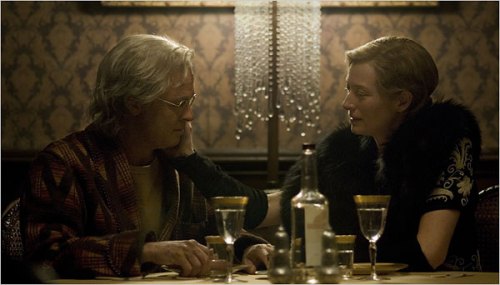
Courtesy: Paramount
And what a curious case it is. Very loosely based on an F.Scott Fitzgerald short story of the same name, the film follows the titular protagonist Benjamin Button (Brad Pitt) as he lives his life. Button journeys, loves and ultimately mourns just like any other man. The reason why his story is remarkable is that he was born with the body of an 80 year old man after the end of WWI and continued to grow ever younger while the world and most importantly the love of his life, Daisy (Cate Blanchett) slowly eroded and decayed in typical fashion.
Admittedly off putting, Button’s central concept is difficult to accept and easy to deride as mere fantasy. That, however, would be missing the point since it is far more accurate to regard Button as more of a thought experiment than an actual chronicle. It is a theoretical construct whose main purpose is to prod the viewer into examining his or her own beliefs and fears about mortality. When asked by Daisy if he notices the process and effects of becoming a younger man, Benjamin replies that all he sees when he looks in the mirror are his own eyes. This casually tossed off line is symbolic in more ways than one. Button just has a transcendental quality about it lacking from screenwriter Eric Roth’s perfectly fine previous work, Forrest Gump, because it goes through the greatest generations greatest hits( WW2 and the Beatles make predictable cameos) yet refuses to be defined by them. In fact, what one notices most about Button’s life is not that he had an affair with a woman who would go on to swim the English channel but that he adored Daisy and longed for a simple life together being a good father to their child. He just wanted to keep living, not setting records, changing the world or advancing humanity, but rather to just enjoy a quiet motorcycle ride or a furlough on his boat.
Not only philosophically sound, Button is also testament to the artistic mastery of the people involved in its creation. After a haunting performance in The Assassination of Jesse James by the Coward Robert Ford, Pitt continues to deliver exponential returns. His performance is restrained but perfectly so. His Button comes across successfully as both a thoughtful wanderer and a regular man with sound values and decency. Although he wrestles with his celebrity, no actor working today, George Clooney excluded, has managed to carry on the tradition of the grand American leading man and create such meaningful work. He has a remarkable charisma that makes a simple shot of him riding a classic motorcycle adorned in a leather jacket and aviators instantly iconic.
Furthermore, it is a bit odd that the man carrying on the tradition of the American epic is none other than Seven and Fight Club director David Fincher. Always prodigiously gifted, Fincher has thus far preferred to toil on the edges of mainstream American cinema, making movies about sociopathic pugilists and sadistic serial killers. Now, he’s making a downright Speilbergian story. Luckily, Fincher’s dark sensibility and visual mastery matches perfectly with the material even as the script seems to have inspired a blossoming romanticism in the director. Though he would never admit it, his swooning visuals of Daisy dancing in the mist and Benjamin pondering death against an elegiac sunrise speak to this newly softened edges while the dark undercurrents — ironic hurricane Katrina references, the unflinchingly grotesque appearance of young Benjamin — harken back to his earlier days of shock and awe.
Button asks many questions of the audience and even inspires a few fits of existential despair. While the year’s other premier film, Synecdoche, New York left viewers in this emotional maw, Button offers viewers an answer of sorts with a simple montage of its characters. They are all dead and long gone as they knew they would be. Yet, they are still shown as they would want to be remembered: laughing, crying and living.
-Vman

i was pleasantly surprised to find out that F. Scott Fitzgerald wrote the short story upon which Benjamin Button (the movie) was based, then mention this in the opening credits